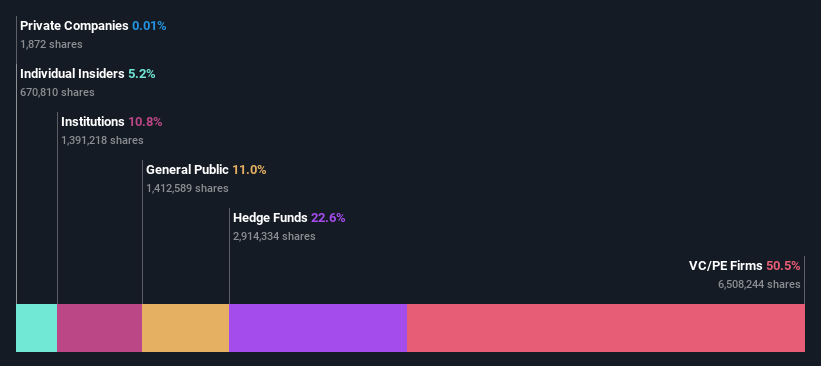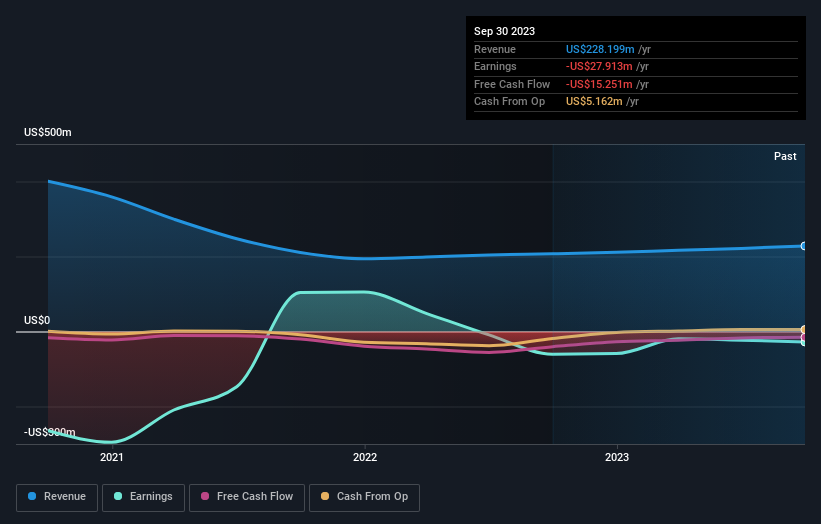Sonida Senior Living, Inc.'s (NYSE:SNDA) largest shareholders are private equity firms who were rewarded as market cap surged US$106m last week
Key Insights
Significant control over Sonida Senior Living by private equity firms implies that the general public has more power to influence management and governance-related decisions
The largest shareholder of the company is Conversant Capital LLC with a 50% stake
Every investor in Sonida Senior Living, Inc. (NYSE:SNDA) should be aware of the most powerful shareholder groups. And the group that holds the biggest piece of the pie are private equity firms with 50% ownership. That is, the group stands to benefit the most if the stock rises (or lose the most if there is a downturn).
As a result, private equity firms were the biggest beneficiaries of last week’s 17% gain.
Let's take a closer look to see what the different types of shareholders can tell us about Sonida Senior Living.
See our latest analysis for Sonida Senior Living
What Does The Institutional Ownership Tell Us About Sonida Senior Living?
Institutional investors commonly compare their own returns to the returns of a commonly followed index. So they generally do consider buying larger companies that are included in the relevant benchmark index.
Sonida Senior Living already has institutions on the share registry. Indeed, they own a respectable stake in the company. This can indicate that the company has a certain degree of credibility in the investment community. However, it is best to be wary of relying on the supposed validation that comes with institutional investors. They too, get it wrong sometimes. It is not uncommon to see a big share price drop if two large institutional investors try to sell out of a stock at the same time. So it is worth checking the past earnings trajectory of Sonida Senior Living, (below). Of course, keep in mind that there are other factors to consider, too.
It looks like hedge funds own 23% of Sonida Senior Living shares. That catches my attention because hedge funds sometimes try to influence management, or bring about changes that will create near term value for shareholders. Our data shows that Conversant Capital LLC is the largest shareholder with 50% of shares outstanding. This implies that they have majority interest control of the future of the company. Siget, L.L.C. is the second largest shareholder owning 17% of common stock, and Ortelius Capital Partners, LLC holds about 5.3% of the company stock. In addition, we found that Brandon Ribar, the CEO has 1.8% of the shares allocated to their name.
While studying institutional ownership for a company can add value to your research, it is also a good practice to research analyst recommendations to get a deeper understand of a stock's expected performance. Our information suggests that there isn't any analyst coverage of the stock, so it is probably little known.
Insider Ownership Of Sonida Senior Living
The definition of company insiders can be subjective and does vary between jurisdictions. Our data reflects individual insiders, capturing board members at the very least. The company management answer to the board and the latter should represent the interests of shareholders. Notably, sometimes top-level managers are on the board themselves.
Insider ownership is positive when it signals leadership are thinking like the true owners of the company. However, high insider ownership can also give immense power to a small group within the company. This can be negative in some circumstances.
Our most recent data indicates that insiders own some shares in Sonida Senior Living, Inc.. In their own names, insiders own US$21m worth of stock in the US$399m company. It is good to see some investment by insiders, but it might be worth checking if those insiders have been buying.
General Public Ownership
The general public, who are usually individual investors, hold a 11% stake in Sonida Senior Living. This size of ownership, while considerable, may not be enough to change company policy if the decision is not in sync with other large shareholders.
Private Equity Ownership
With an ownership of 50%, private equity firms are in a position to play a role in shaping corporate strategy with a focus on value creation. Some investors might be encouraged by this, since private equity are sometimes able to encourage strategies that help the market see the value in the company. Alternatively, those holders might be exiting the investment after taking it public.
Next Steps:
It's always worth thinking about the different groups who own shares in a company. But to understand Sonida Senior Living better, we need to consider many other factors. To that end, you should be aware of the 3 warning signs we've spotted with Sonida Senior Living .
Of course this may not be the best stock to buy. So take a peek at this free free list of interesting companies.
NB: Figures in this article are calculated using data from the last twelve months, which refer to the 12-month period ending on the last date of the month the financial statement is dated. This may not be consistent with full year annual report figures.
Have feedback on this article? Concerned about the content? Get in touch with us directly. Alternatively, email editorial-team (at) simplywallst.com.
This article by Simply Wall St is general in nature. We provide commentary based on historical data and analyst forecasts only using an unbiased methodology and our articles are not intended to be financial advice. It does not constitute a recommendation to buy or sell any stock, and does not take account of your objectives, or your financial situation. We aim to bring you long-term focused analysis driven by fundamental data. Note that our analysis may not factor in the latest price-sensitive company announcements or qualitative material. Simply Wall St has no position in any stocks mentioned.


